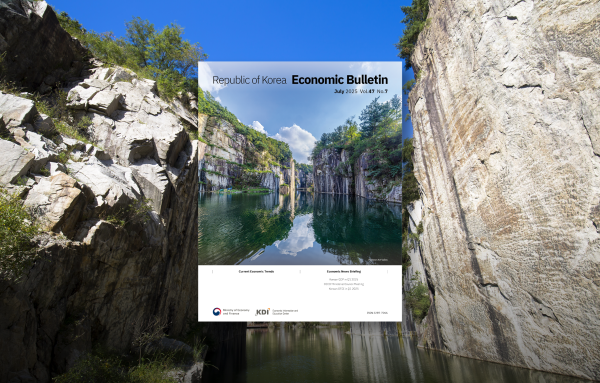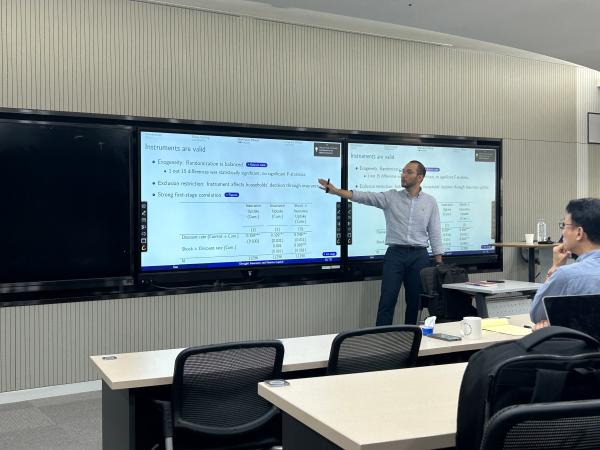
Republic of Korea Economic Bulletin, February 2024
- Date 2024-02-01 15:04
- CategoryResearch and Education
- Hit1297
The Economic Information and Education Center (EIEC) of KDI published the monthly periodical “Republic of Korea Economic Bulletin, February 2024” to promote a greater understanding of the Korean economy by providing readers with information on the latest economic trends and policy issues as well as relevant news and current events.
The February publication provides the updated information related to the overall Korea’s economy including 2024 economic policies, Korea’s GDP in 2023, measures for the Lunar New Year, and inbound FDI in 2023. Main content is as follows:
[Economic Bulletin, February 2024]
[Current Economic Trends]
1. Economic activity
2. Financial markets
3. Public finance
[Policy Issue]
2024 Economic Policies
[Economic News Briefing]
1. Korean economy grew by 1.4% in 2023
2. Measures to support the public’s livelihoods ahead of the Lunar New Year
3. Korea achieves inbound FDI of US $32.7 billion in 2023
Overview
In November, industrial production and retail sales increased while services production, facility investment, and construction investment decreased. In December, job growth expanded and inflation slowed down.
In November, total production grew (up 0.5% month-on-month and up 2.5% y-o-y) driven by increased industrial production (up 3.3% m-o-m and up 5.3% y-o-y), despite a decrease in services production (down 0.1% m-o-m and up 1.9% y-o-y).
In November, retail sales rose (up 1.0% m-o-m and down 0.3% y-o-y), while facility investment (down 2.6% m-o-m and down 11.9% y-o-y) and construction investment (down 4.1% m-o-m and up 1.4% y-o-y) declined.
In December, exports increased by 5.1 percent from a year ago, driven by increased exports of semiconductors, automobiles, and vessels. The daily average of exports increased by 14.5 percent from a year ago to US $2.6 billion.
In December, the Consumer Sentiment Index (CSI) rose by 2.3 points from the previous month to 99.5. The Business Survey Index (BSI) remained steady at 70 from the previous month and the BSI outlook for December declined 1 point to 68.
In November, the cyclical indicator of the coincident composite index decreased by 0.1 points from the previous month, while the cyclical indicator of the leading composite index increased by 0.2 points.
In December, the economy added 285 thousand jobs compared to the previous year and the unemployment rate rose by 0.3 percent points from a year ago to 3.3 percent.
In December, the Consumer Price Index (CPI) rose at a slower pace, increasing by 3.2 percent from the previous year. The index excluding food and energy prices increased by 2.8 percent, and the index excluding agricultural and petroleum products increased by 3.1 percent. The CPI for basic necessities roses by 3.7 percent.
In December, the Korean equity market rose for the month while treasury bond yields fell and the Won strengthened against the dollar amid rising expectations for an earlier rate cut by the US Fed.
In December, housing prices declined (from up 0.04% to down 0.10% m-o-m), and the growth of Jeonse (lump-sum deposits with no monthly payments) prices slowed down (from up 0.27% to up 0.12% m-o-m).
The signs of an upturn are gradually growing stronger for the Korean economy, mainly driven by rebounding exports, amid a sustained easing of inflationary pressures. However, the pace of the economy’s recovery differs across sectors, while concerns of weakening private consumption and construction investment continue to weigh on the economy.
Internationally, concerns of a weak economic recovery persist despite expectations of growth in the global IT industry. At the same time, the risk of instability stemming from geopolitical events and the supply chain remain heightened amid conflict in the Middle East and Russia-Ukraine.
The government will place policy priority on the recovery of the public’s livelihood, particularly for the most vulnerable, while stabilizing prices. Policy efforts will also be made on promoting economic growth and opportunities for future generations while managing potential risks to the economy such as growing concerns surrounding project financing in the real estate market.
Please click on the Economic Bulletin banner below to see and download the latest full PDF including previous editions.
If you have any inquiries, please feel free to contact us.
(KDI Economic Bulletin, +82-44-550-4170, sjung@kdi.re.kr)
Related News
-

Research and Education10 days ago
Republic of Korea Economic Bulletin, July 2025#KDI #Economic #KDISCHOOL #kdischool #Economic Bulletin #Research
-

Story13 days ago
Summer 2025 Talent Donation Program: KDIS Forums Host Sejong High School Students#KDISCHOOL #KDIS #student #talent donation #student forums #student clubs
-

Research and Education14 days ago
Research Seminar by Hyuk Harry Son from Utrecht University



